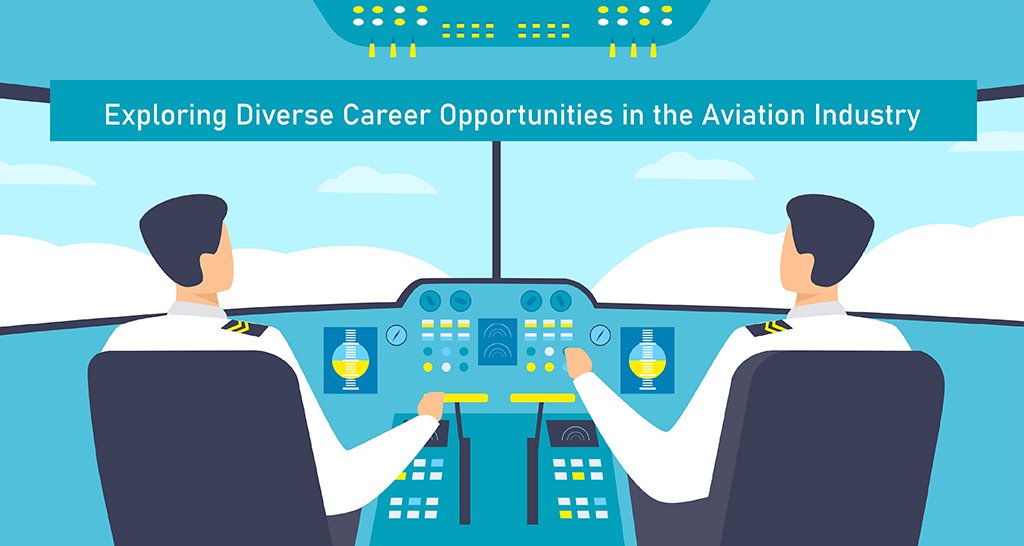The Aviation Industry has revolutionized how we travel, connect, and explore the world. From commercial flights to space exploration, aviation has opened up new horizons and possibilities for humanity. The industry encompasses various fields and career paths, from designing and building aircraft and spacecraft to operating and maintaining them, managing airports and airlines, and ensuring legal compliance.
This article will explore the diverse opportunities available in the aviation industry, including aerospace and aeronautical engineering, aviation and piloting, defense, government sector aviation, research, cabin crew and ground handling, management, hospitality and tourism, and law. Some careers may overlap across different categories, such as pilots who may work in both aviation and defense sectors and aerospace engineers who may work in both the government and private sectors.
Aerospace and Aeronautical Engineering are closely related fields that involve designing, developing, and testing aircraft and spacecraft. These fields are critical for advancing space exploration, commercial and military aviation. Professionals in both fields work on projects related to flight mechanics, aerodynamics, propulsion systems, and structural design. A career in Aerospace and Aeronautical Engineering can include roles such as Aerospace Engineer, Aeronautical Engineer, Flight Test Engineer, and Service Maintenance Engineer. Flight Test Engineers test aircraft and their systems to ensure their safety and performance, while Service Maintenance Engineers inspect and maintain aircraft and their systems to ensure their safety and efficiency. It’s worth mentioning that these careers can overlap across different sectors, such as government, defense, and private industries.
Aviation and Piloting is another exciting career path that involves operating aircraft for various purposes, such as transporting passengers, cargo, or military operations. Pilots are highly skilled professionals who undergo rigorous training to obtain their licenses and maintain proficiency. They must deeply understand aircraft systems, aviation regulations, weather patterns, and navigation techniques. Other professionals in this field include Flight Attendants who ensure the safety and comfort of passengers during flights, Aviation Line Technicians who maintain and repair aircraft and their systems, and Cargo Managers who oversee cargo transportation via plane.
A career in Defense and Government Sector Aviation involves serving in the military or working for government agencies related to national security. In the Air Force, individuals can work in various roles, such as pilots, mechanics, or air traffic controllers. These careers require individuals to undergo rigorous training, have a strong sense of discipline and attention to detail, and be prepared to work in challenging environments. A career in Defense and Government Sector Aviation can offer opportunities to work on cutting-edge technology and projects, travel the world, and significantly impact national security.
Research plays a vital role in the Aerospace and Aeronautical industry, and organizations like the National Aeronautical Laboratory, NASA, and ISRO are at the forefront of innovation in the field. These organizations conduct extensive research and development to improve safety, efficiency, and sustainability in aviation and space exploration. NASA and ISRO are leading space agencies contributing significantly to space exploration and scientific research. Their groundbreaking work has opened up new possibilities for space travel, satellite technology, and understanding our universe. These organizations have also inspired and motivated the next generation of engineers, scientists, and researchers to pursue careers in Aerospace and Aeronautical engineering. Overall, research is crucial to the advancement of the industry and the development of new technologies that benefit humanity.
Another aspect of the Aviation industry is Cabin Crew and Ground Handling. Diploma programs such as Air Hostess, Stewardship, and In-flight Cabin Crew Operations train individuals for careers in the airline industry as cabin crew members. Air Hostesses ensure the safety and comfort of passengers during flights and provide them with food and beverage services. Airport Ground Handling professionals handle various tasks, such as luggage handling, passenger check-in, and aircraft maintenance. Diploma programs such as Air Cargo Management train individuals for careers in the air cargo industry.
Hospitality, Management, and Tourism are also essential aspects of the aviation industry. Roles such as Tour Operator, Sales Manager, Operations Manager, Professor and Lecturer, Reservations Executive, Travel and Tourism Manager, Information Assistant, and Hospitality and Hotel Administration are critical for the smooth operation of airlines and airports. These roles ensure that passengers have a seamless travel experience and that the airline or airport operations run efficiently.
Finally, legal expertise is critical for the aviation industry. Legal professionals are essential in ensuring that aviation and aerospace industries comply with laws and regulations related to safety, security, and environmental impact. Specialized master’s degree programs such as LLM International Air, Space, and Telecommunications Law focus on legal issues related to the aviation and aerospace industries, including telecommunications and space law.
In conclusion, the aviation and aerospace industries offer many exciting and rewarding career opportunities. From designing and building aircraft and spacecraft to operating them, maintaining them, and managing air travel, there is a career path for anyone interested in this field. Aerospace and aeronautical engineering are critical for advancing space exploration, commercial and military aviation. Pursuing a career in these fields requires a strong passion for aviation, a deep understanding of aircraft systems and regulations, and a willingness to learn and adapt to new technologies and challenges continually. Aviation and piloting careers involve operating aircraft for various purposes, while defense and government sector aviation careers are focused on national security. Other related fields include hospitality, management, tourism, and law.












